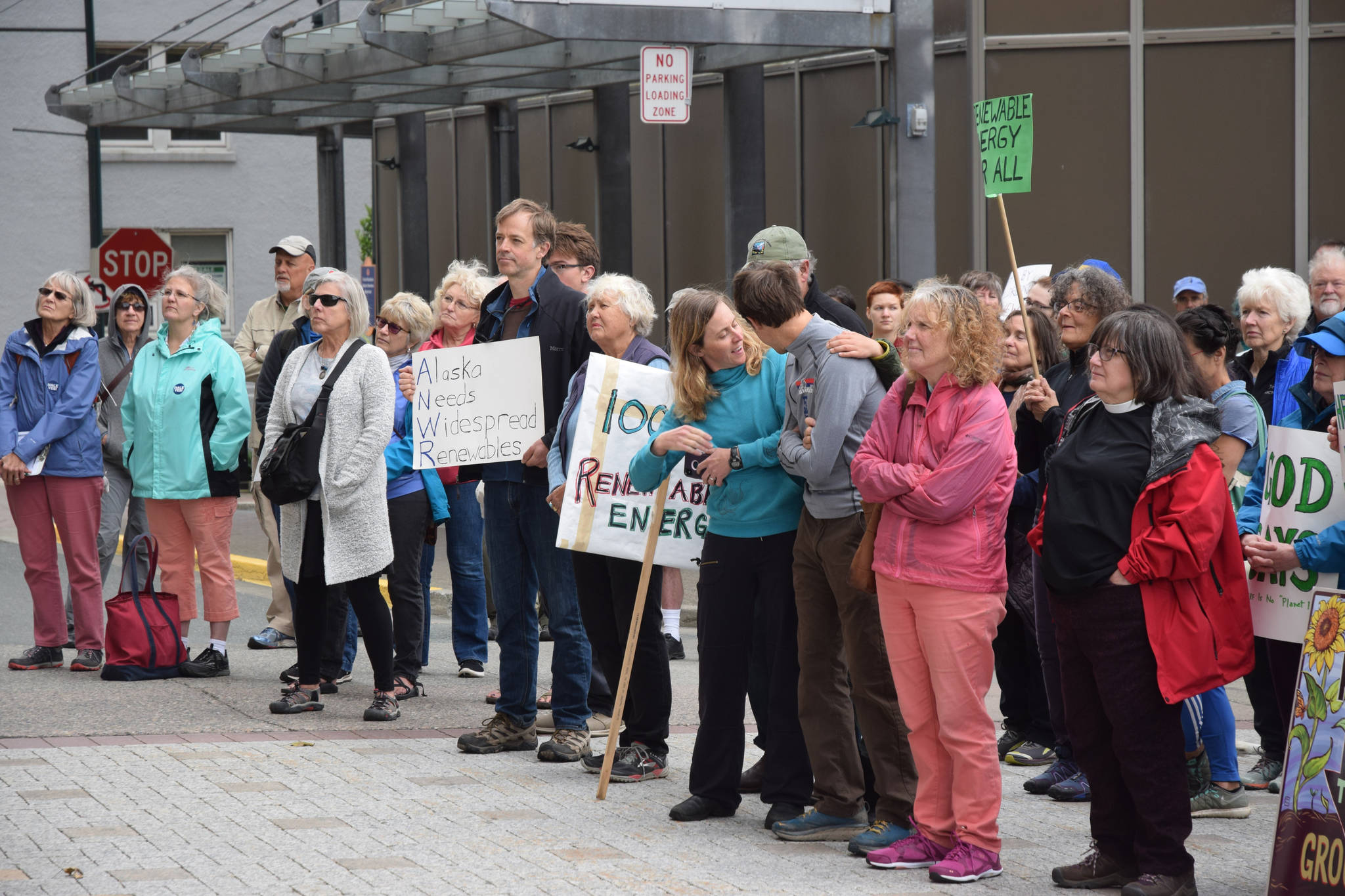Dr. Don Wuebbles, a former climate scientist for the Obama administration, led a chant outside the Alaska Capitol building on Saturday morning. Before him on the Capitol steps about 200 locals gathered to call for progress on climate change as part of the Juneau Rise for Climate Rally.
“Conserve, convert, cooperate,” Wuebbles said.
With Alaska’s temperature rising at twice the rate as the global average, it’ll take those values to make a positive impact on climate change issues, Wuebbles said.
“Conserve, convert, cooperate,” the crowd chanted back.
The event was one of 250 such rallies and marches nationwide, part of what’s known as the Rise for Climate, Jobs and Justice mobilization. The lead rally took place in San Fransisco on Saturday ahead of the Global Climate Action Summit, which will take place there Sept. 12-14.
A coalition of local climate action groups put the event on, including 350 Juneau — Climate Action for Alaska, Renewable Juneau, Alaska Interfaith Power and Light, University of Alaska Southeast Sustainability Committee, and the Southeast Alaska Conservation Council.
Their chief demands are for real climate leadership and a transition to 100 percent renewable energy, a halt to all new fossil fuel projects and divestment from all fossil fuels.
Wuebbles was the keynote speaker. He’s been to Alaska several times, or what he called the “canary in the coal mine” for climate change, and has become friends with Beth Kerttula, a former Alaska House representative. Both worked for former President Barack Obama.
Wuebbles is the coordinating lead author of the Climate Science Special Report. The human race has three options when confronting climate change, he said: mitigate, adapt or suffer.
“Mitigation alone is not adequate. Adaptation alone is not adequate. We need to do enough mitigation to avoid the unmanageable, enough adaptation to manage the unavoidable,” Wuebbles said.
Other ralliers expressed hope for the future in the face of a tough challenge. Elaine Schroeder spoke on behalf of 350 Juneau — Climate Action for Alaska, her young granddaughter next to her on the Capitol steps.
Her group is calling for the Alaska Permanent Fund to divest from fossil fuels. In February, Schroeder and other 350 Juneau — Climate Action for Alaska members testified before the Alaska Permanent Fund Corporation to stop it from investing in fossil fuels.
The fund isn’t getting its return on investment, she said.
“We’re not alone, the divestment movement is spreading. Universities and foundations, and now even a whole country, Ireland, has divested from fossil fuels,” Schroeder said.
Electric vehicle numbers still rising
After the rally, a fleet of electric vehicles took ralliers to an electric vehicle meetup at the Juneau Subport.
While the ralliers at the Capitol spoke of collective action, electric vehicle owners discussed the choices individuals can make to reduce their energy use.
Leaves fell in a brisk wind downtown while electric vehicle owners — and one electric boat owner — talked all things battery-powered. Another type of leaf is rising, said Steve Behnke of the group Renewable Juneau.
The Nissan LEAF is now ubiquitous in Juneau, and the number of electric vehicles in Juneau has grown to about 300, Behnke estimated. This time last year that count was at about 175.
“I don’t think anyone has looked in the last few months, but it’s at least 300,” he said.
Other vehicle options like the Chevrolet Volt are gaining traction in the capital city, he said. LEAFs are good used vehicles, he said, and locals who travel to Seattle to buy LEAFs are now encountering competition buyers from countries like Norway, where EVs make up about 40 percent of vehicles on the road.
Volkswagens and a Tesla could also be seen in the parking lot.
“There’s quite a bit more diversity,” in the make and model of EVs in Juneau, Behnke said.
Renewable Juneau was formed to push locals and the city to move to renewable resources. The group helped in forming the City and Borough of Juneau’s Climate Action and Implementation Plan, which calls for Juneau to source 80 percent of its energy from non-fossil fuel sources by 2045.
It also helped push CBJ to secure funds for the first electric bus for Capital Transit, which is expected in 2019.
The group also encourages the purchase and use of ground source heat pumps. The pumps — basically refrigerators in reverse — use about one-third the electricity as electric baseboards, Behnke said.
• Contact reporter Kevin Gullufsen at 523-2228 and kgullufsen@juneauempire.com. Follow him on Twitter at @Kevin Gullufsen.

